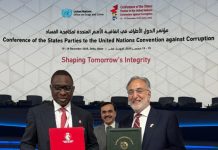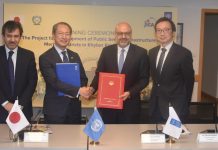By Adnan Rafique
ISLAMABAD: United Nations Office on Drugs and Crime (UNODC) Country Officer Pakistan (COPAK) in collaboration with the Federal Investigation Agency (FIA) on Tuesday launched an awareness raising campaign on the risks and challenges of Trafficking in Persons (TIP) and Smuggling of Migrants (SOM) in Pakistan.
The campaign targets relevant stakeholders including law enforcement, media, academia, civil society organizations, non-government organizations (NGOs) and relevant government departments and the public in general, to strengthen in-country Trafficking in Persons (TIP) and Smuggling of Migrants (SOM) prevention and response capacity.
The campaign is being implemented with the financial support of the Government of Canada through Immigration, Refugees and Citizenship Canada (IRCC). It will include publishing and distributing awareness brochures and pamphlets, streamers, banners, airing of public service messages on radio and social media accounts as well as mobile Short Messaging Service (SMS) to increase awareness of risks, issues, and challenges related to TIP and SOM.
While talking to the participants, Dr. Jeremy Milsom, UNODC Representative, Pakistan, commented, “According to UNODC’s 2020 Global Report on Trafficking in Persons, Criminals trafficking children target victims from extremely poor households, dysfunctional families, or those who are abandoned with no parental care.
In low-income countries, children make up half of the victims detected and are mainly trafficked for forced labor (46 percent). In higher-income countries, trafficking crimes against children may also be for sexual exploitation, forced criminality or begging.”
Mr. Ashraf Zubair Siddiqui, Additional Director General, Immigration FIA welcomed the dignitaries and said “The Government of Pakistan is acutely aware and stands fully committed to its international obligations to combat these inhuman and terrible crimes. FIA, as the lead agency against these crimes, has developed and maintained excellent relations with its international partners in general and UNODC in specific which is an abundant demonstration of our commitment. The FIA is grateful in receiving the support from UNODC to capacity building of agency in serious organized crime such as human trafficking and migrant smuggling, in policy and legislative reforms, trainings, equipment, research and development and international cooperation.”
He further added, “FIA and UNODC hold a solid and long history of cooperation in the fight against TIP and SOM.
In 2018, together with UNODC
two laws on TIP and SOM were passed by the parliament followed by the
approval of implementing rules in early 2021. The National Action Plan to
combat TIP and SOM (2021-2025) was also drafted with the support of UNODC,
which provides a clear guideline of what steps we must take during the next
five years.
“The awareness campaign launched today will help to protect the most
vulnerable from being preyed upon by human traffickers and migrant
smugglers. This campaign will help ensure that information reaches those in
most need and enable civil society, policymakers, government officials to
work together to help prevent and respond to these crimes. Canada will
continue to work alongside our partners, such as the Government of Pakistan,
the UNODC, in fighting trafficking and smuggling operations. These efforts
will also support safe migration, and increasing awareness is a critical
component of that,” Mr. Matthew Ciavaglia Representative Canadian High
Commission to Pakistan said.
The campaign will be implemented nationwide in close partnership with the
FIA and other relevant stakeholders. Civil Society will be a key partner in
this process as UNODC understands that the government and civil society must
work in close partnership to fight human trafficking and migrant smuggling.
The way to succeed in this fight is through a joint effort to raise
awareness of these crimes among a much broader mass of relevant
stakeholders. This campaign is important as it combines both prevention and
protection strategies, which will support civil society organizations in
their efforts to help potential victims of trafficking and vulnerable
migrants.






